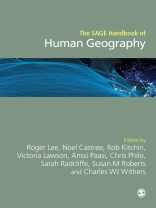Superb! How refreshing to see a Handbook that eschews convention and explores the richness and diversity of the geographical imagination in such stimulating and challenging ways.
– Peter Dicken, University of Manchester
‘Stands out as an innovative and exciting contribution that exceeds the genre.’
– Sallie A. Marston, University of Arizona
‘Captures wonderfully the richness and complexity of the worlds that human beings inhabit… This is a stand-out among handbooks!’
– Lily Kong, National University of Singapore
‘This wonderfully unconventional book demonstrates human geography’s character and significance not by marching through traditional themes, but by presenting a set of geographical essays on basic ideas, practices, and concerns.’
– Alexander B. Murphy, University of Oregon
‘This SAGE Handbook stands out for its capacity to provoke the reader to think anew about human geography … essays that offer some profoundly original insights into what it means to engage geographically with the world.’
– Eric Sheppard, UCLA
Published in association with the journal
Progress in Human Geography, edited and written by the principal scholars in the discipline, this Handbook demonstrates the difference that thinking about the world geographically makes.
Each section considers how human geography shapes the world, interrogates it, and intervenes in it. It includes a major retrospective and prospective introductory essay, with three substantive sections on:
- Imagining Human Geographies
- Practising Human Geographies
- Living Human Geographies
A key reference for any scholar interested in questions about what difference it makes to think spatially or geographically about the world, this Handbook is a rich and textured statement about the geographical imagination.
Зміст
VOLUME ONE
Part I: Imagining Human Geographies
Place – Tim Cresswell
Mobilities – Johanna Waters
Spatialities – Jacques Lévy
Difference – Katharyne Mitchell
More-than-Human Geographies – Beth Greenough
Society-Nature – Andrea Nightingale
Transformations – Dan Clayton
Critique – Alastair Bonnett
Geo-historiographies – Trevor Barnes
Part II: Practising Human Geographies
Capturing (GIS) – Matt Wilson and Sarah Elwood
Noticing – Eric Laurier
Representing – Anna Barford
Writing (somewhere) – Juliet Fall
Researching – Meghan Cope
Producing – Mia Gray
Engaging – Jane Wills
Educating – Avril Maddrell and Jenny Hill
Advocacy – Audrey Kobayashi
VOLUME TWO
Part III: Living Human Geographies
Ethics – Elizabeth Olson
Economy – Marianna Pavlovskaya and Kevin St Martin
Society – Jamie Winders
Culture – Patricia Price
Politics – David Featherstone
Words – Christopher Philo and Cheryl Mc Geachan
Power – Louise Amoore
Development – Kate Wills
Bodies – Rachel Silvey and Jean-Francois Bissonnette
Identities – Robyn Dowling and Katherine Mc Kinnon
Demographies – Elspeth Graham
Health – Matt Sparke
Resistance – Sarah Wright
Part IV: Appendix- Transcriptions
Online Video Conversations
Why Human Geography?: an editorial conversation – Roger Lee, Noel Castree, Sarah Elwood, Rob Kitchin and Susan Roberts
Geography and geographical thought – David Livingstone and Doreen Massey
Nature and Society – Susan Owens and Sarah Whatmore
Geography and geographical practice – Katherine Gibson and Susan J Smith
Про автора
Professor Charles W J Withers is Ogilvie Chair of Geography and Professor of Historical Geography at the University of Edinburgh. He has been a professor in Edinburgh since 1994. He is a fellow of the British Academy, of the Royal Society of Edinburgh, the Royal Scottish Geographical Society, and the Royal Historical Society. In 2008, he was awarded the Centenary Medal of the Royal Scottish Geographical Society in recognition of his ‘outstanding and sustained contribution to historical geography, the history of cartography and to the history of geographical knowledge’. In 2012, he was awarded the Founders’ Gold Medal of the Royal Geographical Society. This, one of the Society′s two Royal Gold Medals, was given in respect of his ‘world-leading encouragement and development of historical and cultural geography’. Professor Withers′ research and teaching interests centre on the historical geography of science and the Enlightenment, the historical geographies of print and exploration, and the history of cartography. He is the author or co-author of ten research monographs, and a further nine co-edited volumes, in addition to numerous scholarly articles and essays. His co-authored Scotland: Mapping the Nation (written with Chris Fleet and Margaret Wilkes), which was published in 2011 by Birlinn Press in association with the National Library of Scotland, was the Scottish Research Book of the Year in the Saltire Society Literary Awards for 2012. His most recent book, co-authored with Innes Keighren and Bill Bell, is Travels into Print: Exploration, Writing, and Publishing with John Murray, 1773-1859′. This was published by the University of Chicago Press in May 2015. In 2015, he was appointed by Her Majesty Queen Elizabeth II and First Minister Nicola Sturgeon to the position of Geographer Royal for Scotland, the first person to hold this title as a personal honorific for 118 years. He is currently writing a historical geography of the Prime Meridian, a narrative for which we know the solution (‘Greenwich, from 1884’) but not the problem.












